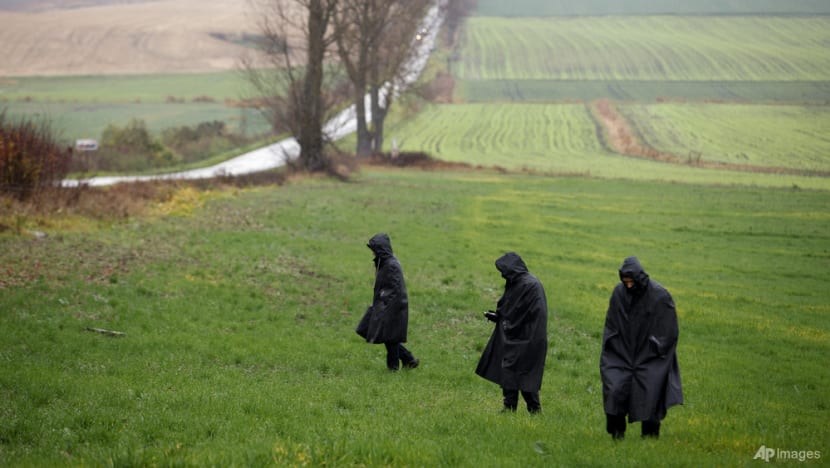Even if Poland missile strike was ‘inadvertent’, it could happen again, says expert
The most likely culprit at the moment is a Ukrainian air defence missile that was fired at a Russian missile, says a researcher.

Police officers check and secure an area outside a grain depot where an explosion of a missile killed people in Przewodow, Poland, Nov 16, 2022. (Photo: AP/Michal Dyjuk)
SINGAPORE: The missile strike in Poland that killed two people may have been “inadvertent” but such an incident could happen again, said an expert on Wednesday (Nov 16).
“As long as Russia is intending to fire long-range cruise missiles out targeting western Ukraine, there is potential that they go off-course or get shot out by Ukrainian air defences," said Associate Professor Matthew Sussex.
"That makes the border area between Poland and Ukraine potentially vulnerable.
“So, whereas I don't think it's intentional, certainly an inadvertent event … Russian tactics do suggest that this may in fact happen again.”
Assoc Prof Sussex, a fellow at the Australian National University’s Strategic and Defence Studies Centre, was speaking to CNA’s Asia Now in the wake of the fatal incident, which came as Russia unleashed a wave of missiles targeting Ukrainian energy infrastructure - attacks that Kyiv said were the heaviest in nearly nine months of war.
Belgium's defence minister said later on Wednesday that the explosion in Poland was probably caused by Ukrainian air defence units firing at incoming Russian missiles.
Mr Ludivine Dedonder's remarks came after United States President Joe Biden said the missile was unlikely to have been fired from Russia.
The US leader was at the global G20 summit in Bali and had spoken with Western allies amid speculation over whether the blast in Poland, caused by a Russian-made missile, was a deliberate attack by Moscow.
In the event that it was intentional, Poland, as a North Altantic Treaty Organization (NATO) member, would be within its rights to invoke the military alliance’s Article 5, a collective defence pledge under which an attack on one is viewed as an attack on all.
Russia has denied any involvement.
“If it was a Russian-made missile that, for example, Ukraine was using, then I think we can all breathe a little bit easier because clearly that would be an accidental error,” said Dr Malcolm Davis, senior analyst at the Australian Strategic Policy Institute.
"THE MOST LIKELY CULPRIT"
Assoc Prof Sussex, who researches Russian foreign and security policy, noted that the missile was likely an S-300, surface-to-air weapon produced in Russia but used by both Ukrainian and Russian armed forces.
“Ukraine uses these missiles to intercept planes as well as incoming missile strikes on its civilian infrastructure. So, the most likely culprit at the moment is … a Ukrainian air defence missile that was shot at a Russian missile and ended up landing in Poland,” he said.
It was probably a case of the Ukrainians firing at a Russian missile that was heading towards a power generation link between Ukraine and the European Union, which lies “very close” to where the missile impacted the Polish side of the border, said the associate professor.
However, this being potentially an accident does not mean Russia is innocent, he argued.
“That doesn't necessarily exonerate Russia from blame for this, because of course, if Russia wasn't busily shooting cruise missiles at targets in western Ukraine, then there would be no need for Ukraine to use its air defence missiles,” he said.
“So this brings home, I think, the fact that this is a conflict which does have the potential to spill over.”
PRESSURE ON NATO
Even if it is the case that the Ukrainians fired at a Russian missile and missed - or fired at a Russian missile and knocked it off course - NATO will probably have to react in a “fairly robust” way, said Assoc Prof Sussex.
“That's still a significant risk to Poland as a NATO member,” he said.
NATO will need to do more than just "simply" issue a strongly-worded protest note, accompanied by some sanctions, he added.
“There will be a lot of pressure, particularly from Warsaw, for NATO to take action perhaps by sending more troops to Poland … (or by) doing more combat air patrols,” he said.















